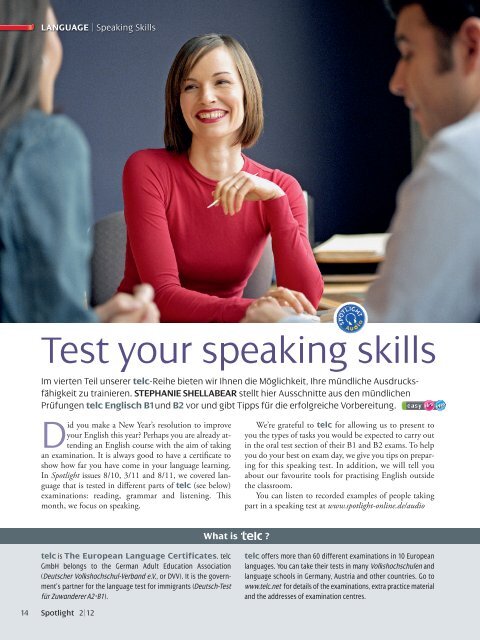Test your speaking skills - Spotlight Online
Test your speaking skills - Spotlight Online
Test your speaking skills - Spotlight Online
You also want an ePaper? Increase the reach of your titles
YUMPU automatically turns print PDFs into web optimized ePapers that Google loves.
LANGUAGE | Speaking Skills<strong>Test</strong> <strong>your</strong> <strong>speaking</strong> <strong>skills</strong>Im vierten Teil unserer telc-Reihe bieten wir Ihnen die Möglichkeit, Ihre mündliche Ausdrucksfähigkeitzu trainieren. STEPHANIE SHELLABEAR stellt hier Ausschnitte aus den mündlichenPrüfungen telc Englisch B1und B2 vor und gibt Tipps für die erfolgreiche Vorbereitung.Did you make a New Year’s resolution to improve<strong>your</strong> English this year? Perhaps you are already attendingan English course with the aim of takingan examination. It is always good to have a certificate toshow how far you have come in <strong>your</strong> language learning.In <strong>Spotlight</strong> issues 8/10, 3/11 and 8/11, we covered languagethat is tested in different parts of telc (see below)examinations: reading, grammar and listening. ismonth, we focus on <strong>speaking</strong>.We’re grateful to telc for allowing us to present toyou the types of tasks you would be expected to carry outin the oral test section of their B1 and B2 exams. To helpyou do <strong>your</strong> best on exam day, we give you tips on preparingfor this <strong>speaking</strong> test. In addition, we will tell youabout our favourite tools for practising English outsidethe classroom.You can listen to recorded examples of people takingpart in a <strong>speaking</strong> test at www.spotlight-online.de/audioWhat is ?telc is The European Language Certificates. telcGmbH belongs to the German Adult Education Association(Deutscher Volkshochschul-Verband e.V., or DVV). It is the government’spartner for the language test for immigrants (Deutsch-<strong>Test</strong>für Zuwanderer A2B1).telc offers more than 60 different examinations in 10 Europeanlanguages. You can take their tests in many Volkshochschulen andlanguage schools in Germany, Austria and other countries. Go towww.telc.net for details of the examinations, extra practice materialand the addresses of examination centres.14<strong>Spotlight</strong> 2|12
What will you have to do?e examiners want to know how well you can• express <strong>your</strong>self;• manage the tasks you are given;• use grammar correctly;• pronounce the language.The format is similar in the B1 and B2 exams. Thereare normally two candidates — perhaps three at B2level — who talk to each other. Two examiners are presentto run the exam and also to listen and to evaluate<strong>your</strong> abilities.e examination itself takes no more than 15 minuteswith two candidates. ere is always a period of 20 minutesbefore the official start of the examination in whichyou will receive <strong>your</strong> candidate sheets and be able to preparewhat you want to say. While you are preparing <strong>your</strong>self,you are not allowed to speak to the other candidates.You may take notes on the sheets you are given, but in theexam itself you are not allowed to read from <strong>your</strong> notes.At B2 level, you may use a dictionary to prepare. e oralexamination counts for 75 of the maximum 300 pointsthat can be gained in the whole telc exam.B1What can you do at level B1?You can take part in conversationsthat have to do with the family,work, school, hobbies, etc. You cantalk about <strong>your</strong> plans and hopes,and you can discuss current topicsand give <strong>your</strong> opinions about them.Part 1: Social contactsis part tests whether you can participate in conversation,formulate questions correctly, and demonstrate to <strong>your</strong>conversation partner that you have understood him or her.You have three or four minutes to make small talk withthe other person (whom you may know from <strong>your</strong> course),using the questions on the candidate sheet. ese are alwaysthe same in telc exams at B1 level.Candidate sheetIn this first part of the examination you will beasked to find out as much information as youcan about the other candidate. Ask only forinformation you don’t already know about theother person.• his / her name• where he / she lives• where he / she comes from• if he / she has ever been to other countries• how long he / she has lived in the area• details of his / her house or flat• details of his / her familyTrackAFotos: Digital Vision; Fotolia; iStockphoto2|12 <strong>Spotlight</strong>15








